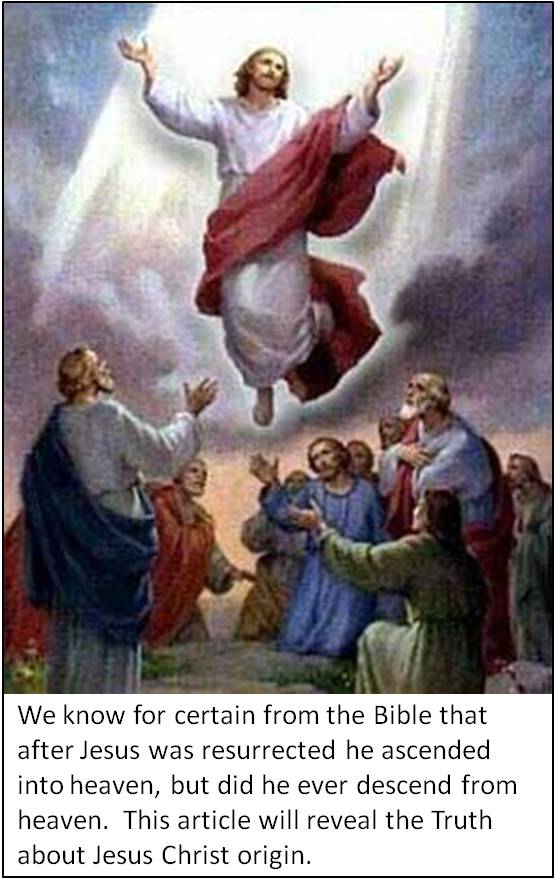Did Jesus Christ really come down from Heaven?
Did Jesus Christ really come down from Heaven?
Introduction
Before we begin it is necessary to make one thing absolutely clear.
The Lord Jesus Christ is the Son of God. He is the greatest Being in all the universe, apart from God Himself. The purpose of this article is to honour the Lord Jesus, as he should be honoured.
Unfortunately, the Bible’s teaching about the Lord Jesus is often misunderstood. In a well-meaning but misguided attempt to honour Jesus, many churches teach things about him that are not Biblical. This booklet sets out to correct these wrong ideas.
This is not from a desire to criticise anybody’s religion, but simply to show what the Bible really teaches about Jesus, the Son of God. Only when we understand this can we give the Lord the glory that he deserves.
By Alan Hayward
“I Came Down from Heaven”
The title of this article is a question: did Jesus Christ come down from heaven? In Chapter 6 of the Gospel of John there is a verse which appears to answer that question. Jesus said:
“I have come down from heaven, not to do my own will, but the will of him who sent me.” (Verse 38.)
But we must not jump to a conclusion. This subject is not nearly as simple as it might seem.
A difficulty arises because there are two very different kinds of language, literal language and figurative language. Both kinds are used by Jesus in the chapter we are considering.
In verse 64 he said, “There are some of you that do not believe.” This is literal language. It means exactly what it says. Even a child could not mistake its meaning.
But many other verses are not like this. Take verses 53 and 54, for instance. Here Jesus said:
“I say to you, unless you eat the flesh of the Son of man and drink his blood, you have no life in you; he who eats my flesh and drinks my blood has eternal life.”
This is figurative language. It does not mean what it appears to say; instead, it carries a deeper meaning. You have to think carefully to discover its real meaning. Consequently, if we are not careful we can easily misunderstand it.
As a matter of fact the unbelieving Jews did misunderstand this and similar sayings of Jesus. They said, “How can this man give us his flesh to eat?” Perhaps they thought Jesus was preaching cannibalism! Whatever they thought, they were very much mistaken.
Well, what about the statement, “I came down from heaven.” Is this literal, or figurative?
There is good reason to think that it could be figurative. In verse 31 of the same chapter there is a mention of what the Old Testament called “manna”. This was a kind of bread which God provided, by a miracle, for His people to eat while they were in the desert. The words of verse 31 are, “He (God) gave them bread from heaven to eat.”
This is obviously figurative language. This miraculous bread was not baked in heaven and then delivered to the earth. The statement that it came from heaven informs us that the God of heaven created it on earth.
There is a famous hymn which people sing at harvest time. The chorus begins, “All good gifts around us are sent from heaven above.” These words are taken straight from the New Testament, from James 1:17, which says that every good gift “is from above, coming down from the Father.” When farmers sing that hymn, they do not imagine that their crops literally come down “from heaven above.” They simply mean that God gives us our harvests.
More Figurative Language
The Bible uses this sort of figurative language about men, as well as about things. It tells us that “there was a man sent from God, whose name was John.” (John 1:6.) Yet John was never in heaven. “Sent from God” simply means that God gave him a special job to do.
But this explanation could only apply to those verses that actually speak of Jesus “coming down” from heaven. There are a number of other passages which seem to suggest, in one way or another, that Jesus once lived in heaven, long before he appeared on earth. This is one of them:
“Father (said Jesus), glorify me in your own presence with the glory which I had with you before the world was made.” (John 17:5)
What are we to make of verses like that? Are they literal, or figurative? Did Jesus really live with God in heaven before the world was made? Or do the words carry some deeper meaning than this?
The purpose of this article is to let the Bible speak for itself and answer those questions for us.
Three Views of Jesus
People who do not believe the Bible usually say that Jesus was just an ordinary man. They are wrong. He was the Son of God. We need not waste any time considering their point of view.
But we shall have to consider the three different views of Jesus that are held by Bible-believing Christians. *
The first view is by far the most widely held. This is that Jesus is God Almighty in human form. People who believe this often refer to Jesus as “the Second Person in the Trinity,” although it is not easy to discover exactly what they mean by that phrase. According to this view, Jesus lived in heaven for ever and ever before he appeared on earth.
The second view is taught by the body known as “Jehovah’s Witnesses,” and a few smaller sects. They say that Jesus is not God, but is a mighty angel who was created by God long ago. They, too, believe that Jesus lived in heaven for a very long time before he lived on earth.
People who hold either of these views, of course, take literally the verses that speak of Jesus coming from heaven.
The third view is held by Christadelphians and some others. According to this view Jesus did not live personally in heaven before he was born on earth; and the verses which refer to his heavenly origin must be understood figuratively.
This is the view that will be explained in this article. If the thought of it surprises you, please be patient and read on. There is a great weight of Bible evidence to support this view.
Jesus Was a Real Man
Jesus was not an ordinary, sinful man. Let us make ho mistake about that. He was a unique man. He was the Son of God. Nevertheless, in a very real sense he was a man and not God Almighty.
This does not mean that he ceased to be a man as soon as he went bodily to heaven. The Bible teaches us to think of him as a man, even now. Long after Jesus had risen from the dead and ascended to heaven, the New Testament was making statements like this:
“God’s grace is much greater, and so is his free gift to so many men through the grace of the one man, Jesus Christ…. How much greater is the result of what was done by the one man, Jesus Christ… many will be put right with God as the result of the obedience of the one man.” (Romans 5:15-19, Today’s English Version.)
“There is one God, and there is one mediator between God and man, the man Christ Jesus.” (1 Timothy 2:5.)
So Jesus really is a man. This is the undoubted teaching of the New Testament. Now compare that with these words by the former Bishop of Woolwich, Dr. Robinson, in his book, “Honest to God,” in a passage where he was explaining how most Christians view Jesus:
“Jesus was not a man born and bred, he was God for a limited period taking part in a charade. He looked like a man, but underneath he was God dressed up – like Father Christmas.”
Many church people find the bishop’s reference to Father Christmas offensive. Yet apart from that, they agree that this is a fair statement of church teaching. If Jesus was really God, or even a mighty angel who once lived in heaven, then he was never a real man, but a Divine Person dressed up in human flesh.
But the New Testament disagrees. It describes Jesus as a man.
This is our first reason for thinking that the usual view of Jesus is mistaken.
The Birth of Jesus
The birth of the Lord Jesus Christ was the result of a mighty miracle. His mother was a young unmarried woman of excellent character. She was a virgin. This was how it happened:
“The angel said to her, ‘Do not be afraid, Mary, for you have found favour with God. And behold, you will conceive in your womb and bear a son, and you shall call his name Jesus… ‘And Mary said to the angel, ‘How shall this be, since I have no husband?’
“And the angel said to her, ‘The Holy Spirit will come upon you, and the power of the Most High will overshadow you; therefore the child to be born will be called holy, the Son of God’.” (Luke 1:30-35.)
Study those words closely. There is much to be learnt from them.
The child was to be Mary’s own son. The angel did not say, “Mary, you will produce a body of flesh for a Divine Person to come and live in.” He said, “You will conceive in your womb and bear a son.” These words were obviously intended to be understood literally. They describe the beginning of a new human life – not the coming to earth of a Divine Person.
Also, if Jesus had been a Divine Person, millions of years older than Mary, could he have been, in any real sense, her son? Yet he washer son, and not just an unusual sort of foster child. Throughout the gospels she is called his mother, and never his foster-mother.
On the other hand, although the man Joseph, who afterwards married Jesus’ mother, is sometimes called his father, we are not left in any doubt about the real facts. Luke refers to Jesus as “the son, as was supposed, of Joseph.” (Luke 3:23.)
So Jesus was truly the son of Mary, not a Divine Person pretending to be the son of Mary. As children do, he took after his mother in many ways. That is what made Jesus truly a man. Real men do not live in heaven before they are born, and neither did this man. His miraculous conception and birth was the very beginning of his existence as a person.
Human nature is weak, and full of temptations. As we shall see later, Jesus inherited the weakness of human nature from his mother.
But that is only half the story. The angel made it plain that the son of Mary was to be also the Son of God. “The power of the Most High will overshadow you; therefore the child to be born will be called holy, the Son of God”, said the angel. (Luke 1:35.)
Jesus also inherited many things from his other parent. God was his father, and from God he inherited the desire to do what was good, always. It was this which helped him to overcome the weakness of his human nature – to’ fight temptation and to conquer it.
To read this complete article click on the pdf… 
![]()

